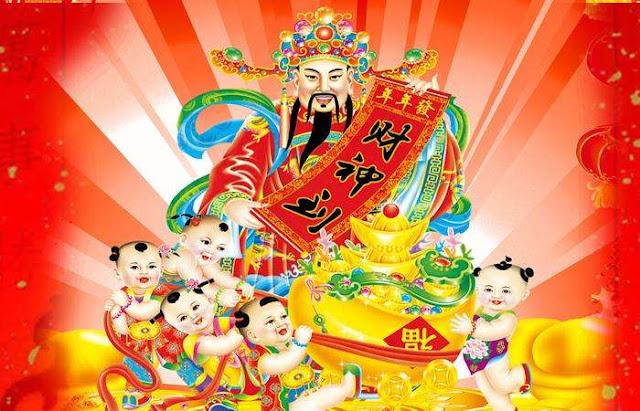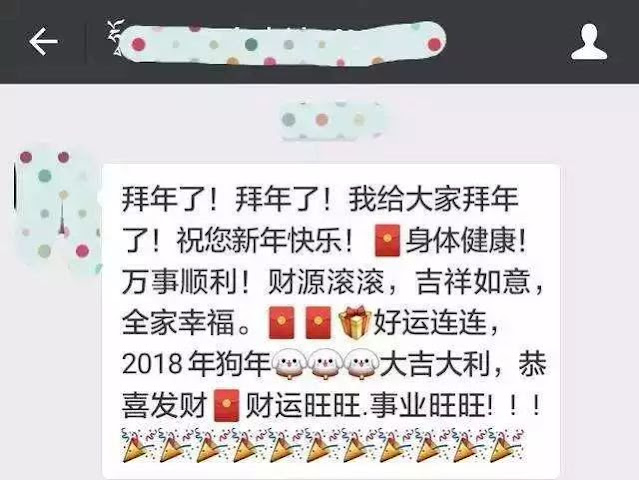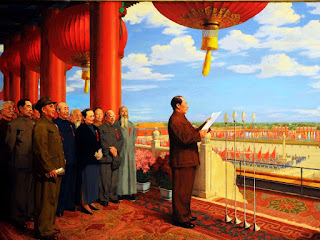Chinese New Year: Origin, Superstitions, Customs, and Activities
The Chinese New Year is an occasion to bid farewell to the old year and usher in the new. Chinese people regard the holiday as the most important event of the year. Those who work outside their hometown must return home and have a family gathering. Gifts are exchanged, feasts are made, firecrackers are set off, and new looks are put on. Everything during the Chinese New Year must be joyous to greet good luck in the new year.
 |
| Spring Festival |
Origin of Chinese New Year - Story of “Nian”
The Chinese New Year is also called Guo Nian (passing the “Nian”). What is “Nian”? It’s said that “Nian” was a ferocious beast that hurt people on the last day of the year and damaging crops. One year, “Nian” the beast came to a village to wreck as usual. He heard a burst of loud, harsh slashing and fled away. It turned out two shepherd boys were competing in whipping. When “Nian” the beast came to another village, he came across red clothes hanging on the door, which scared him greatly. “Nian” the beast decided to take his chance in the next village. Unfortunately, he was dazzled by all the lights. Therefore, people realize that the beast feared loud noise, red color, and light. Ergo, firecrackers, red-colored decorations, and bright lights are three essential elements in Chinese New Year.
 |
| "Nian" the Beast |
Superstitions and Customs of Traditional Chinese New Year
The Chinese Spring Festival often refers to the New Year’s Eve and the Jan.1. However, the traditional Chinese New Year Festival lasts from Dec.23 to Jan.15. During the period, there is specific superstition and custom for each day.
Dec.23: Little Nian, Offer Sacrifice to the God of Kitchen
Dec.23 is the prelude to the Spring Festival. On this day, the God of Kitchen is supposed to report all the critical matters that happened this year to the Jade Emperor. To make sure nothing bad is being said, old Chinese people often offer malt sugar to the God of Kitchen.
 |
| Little Nian |
Dec.24: Spring Cleaning
Spring Cleaning is a long tradition since the pre-Qin ages. On the day, people will sweep their houses meticulously and make sure everything is clean and new. Old and broken items will be thrown out to welcome a bright new year.
 |
| Spring Cleaning |
Dec.25: Receive the Jade Emperor
It’s believed that the Jade Emperor will visit the earth on the day after listening to the God of Kitchen report. Therefore, it’s a day of receiving the Jade Emperor. People must be careful about their behaviors on the day to gain the Jade Emperor’s favor for the next year.
 |
| Receive the Jade Emperor |
Dec.26: Do the Spring Festival Shopping
It’s a day to prepare all kinds of stockings for the holiday. As the festival lasts for over 20 days, and all the family members will gather together, every family will prepare a substantial amount of food, snacks, and daily necessities.
 |
| Do the Spring Festival Shopping |
Dec. 27: Take Paths and Wash Clothes
In old China, running water was not widely provided. People tend to wash their clothes and take baths on the day for the Spring Festival. It’s believed that all the bad lucks and evils in the previous year would be washed off this way.
Dec.28: Prepare Steamed Buns
Northern Chinese people often prepare steamed buns on the day. It’s a hard job for women. In old times, women from several houses gather together to make steamed buns.
 |
| Make Steamed Buns |
Dec. 29: Pay Visits
Family feasts are held on the day to entertain the guests who come for a visit. Incenses must be burned outside the house.
Dec. 30: New Year’s Eve
It’s the last day of the year and one of the most important days. Red lanterns are hung, red couplets and door gods are glued on the door, firecrackers are set off, ancestors’ tombs are visited, family reunion dinner is served, lucky money is given, and people must stay up for the midnight.
 |
| Reunion Dinner |
Jan.1: Welcome the New Year
In the early morning, firecrackers must be set off to scare off the “Nian” and a special table is set to burn incenses and put on sacrificial food. People must wear new clothes on the day and For the first meal of the new year, eat dumplings or Tang Yuan must be served. Both of the foods have auspicious meanings.
At noon, people pay visits to their kinsmen and relatives and give them good wishes for the new year. Some of the lucky food served include baked flower seeds, lotus seeds, longan, apples, oranges.
The wares that containing the food represent good luck. Therefore, it’s unlucky if a bowl or plate is broken. If a ceramic or glass is broken by accident, the pieces must be wrapped with red paper, and remarks of “sui sui ping an (everlasting peace year after year )” must be made.
On the first day of the new year, there are many other taboos. People can't take a bath, wash hair, wash clothes, clean the house, or take out the trash. It’s believed that by doing these things, your luck will be thrown away.
 |
| Pay Visits |
Jan.2: Married Daughters Return to Their Parents’ House
On Jan.2, married daughters must return to their parents’ house with their husbands and children. They must have lucky money and gifts prepared, and have a meal with their parents. Therefore, some families take the family photo on the day. After the visit, those married daughters must get back to their house before dinner. Otherwise, it’s considered unlucky.
Jan.3: Enjoy the Holiday at Home
It’s a day of staying at home and enjoy a great day. It’s not recommended to sweep, cook, and go out.
Jan.4: Welcome the God of Kitchen
It’s the day when the God of Kitchen is back to the kitchen. People offer sacrifices and incense to welcome him back.
Jan.5: Worship the God of Wealth
All the taboos imposed for the previous days are abolished from this day. People can wash clothes, clean the house, take out the trash, etc.. Besides, it’s the birthday of the God of Wealth. Business people reopen on the day.
Jan.6: Get Rid Of Bad Things
It’s a day when people take out ragged clothes, broken things, and trash.
Jan.7: Rensheng Festival
Legend says that Nv Wa took the first six days to make animals, and on the seventh day, she made human beings. Therefore, it’s the day for people to have porridge. Besides, if the day is sunny, everything will be good; if the day is rainy or cloudy, people will suffer from the disease.
Jan.8: Shunxing Festival
According to Taoist doctrines, there are seven stars taking turns to look after the human world. They gather together on Jan.8 to celebrate. Therefore, people often offer sacrifices to them on the day, hoping to get their protection in the new year.
 |
| Shunxing Festival |
Jan.9: Tiangong Day
The Jade Emperor came to visit the human world on Dec.25, and he is supposed to return to heaven on Tiangong Day. People wear their best clothes and offer sacrifice to the Jade Emperor.
Jan.10: Birthday of the Earth
Ancient Chinese attach great importance to the earth. It’s the base for everything. On the day, people burn candles, incenses, and paper at the corner.
Jan.11: Receive the Son-in-laws
It’s a day when fathers-in-law receive their sons-in-law.
Jan.12 - 14: Draw an End
The Spring Festival is close to the end. People often eat something plain like soup and mustard after eating meats for days.
Jan.15: Lantern Festival
It’s the last day of the Chinese New Year and the first full-moon night. Yuan Xiao or Tang Yuan is consumed on the day.
How do Modern Chinese People Celebrate the Spring Festival?
The Chinese New Year is becoming less and less festive in recent years. For young people, it’s just a holiday that they can take a few days off. People invented new ways to celebrate the occasion.
1.No More Firecracker
With the environmental problem intensifying, the Chinese government banned firecrackers in big cities. Only towns and small cities are allowed to set off firecrackers.
2.Digital Red Envelope
Most Chinese people give lucky money through their phones now. Both WeChat and Alipay offer the red envelope service.
3.Snatch Red Envelopes During the Spring Festival Gala
In the last decades, the Spring Festival Gala was a popular event. Chinese people love to sit together on New Year’s Eve and watch the show. However, since the development of the digital red envelope, instead of watching the show, people stare at their phones and try to snatch every digital red envelope that comes up.
 |
| Spring Festival Gala |
4.Reunion Dinner at Restaurant
In the past, people always have a reunion dinner at home. Women work hard to prepare a variety of dishes for the family. Nowadays, more and more families go out for dinner on New Year’s Eve.
5.Pay New Year Greetings Online
Although many people are paying New Year visits in person, online greeting is trending these days.
6.Travel
Traditionally, the Spring Festival is an occasion of reunion. Today, the spring rush is still one of the largest migration on earth. However, the trend is shifting. Many people choose to travel around instead of staying at home. Therefore, the Chinese New Year is becoming a golden time for travel, especially to nice and warm places.
After thousands of years, the Chinese New Year still holds a special place in Chinese people’s hearts. Most of the traditional customs are lost, but people still cherish the memory and the family reunion. When the city is decorated with red lanterns and blessing banner, you know the Spring Festival is coming. It’s time to relax and celebrate!





















Comments
Post a Comment